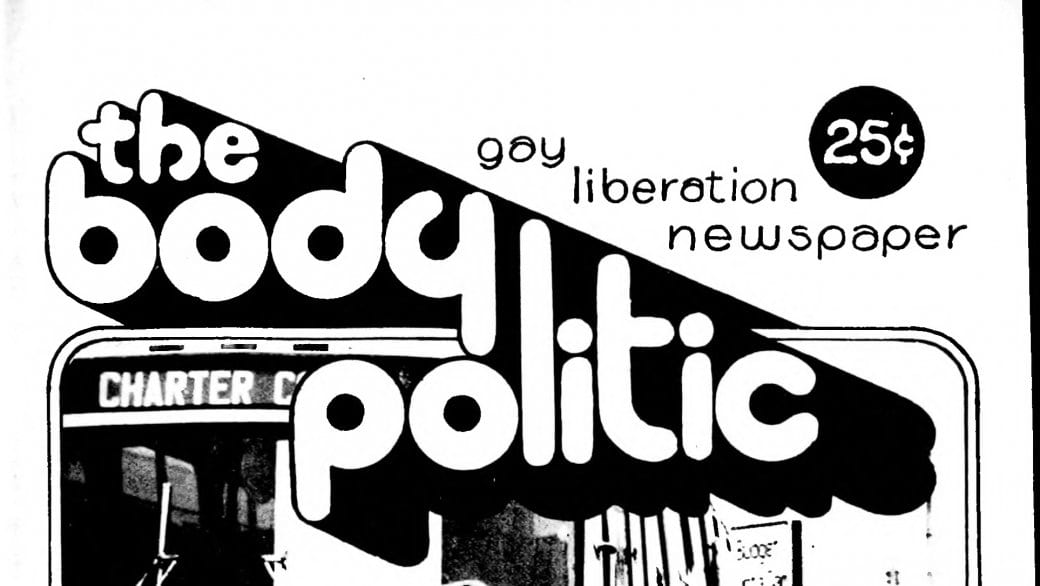What was The Body Politic?
The Body Politic was a groundbreaking gay and lesbian magazine published out of Toronto from 1971 to 1987. The magazine played an instrumental role in many formative battles in the gay liberation movement of the ’70s and ’80s. It operated as a collective, so there wasn’t an official internal hierarchy.
The Body Politic was a wide-ranging, provocative, radical gay and lesbian magazine with international reach that covered issues both within Canada and internationally. Its readership reflected that as well, with about a third of its readers located in Toronto, a third in the rest of Canada and the rest abroad, especially in the United States, but also the UK, India, Australia and Western Europe.
Despite its importance, some people argue that The Body Politic, both in its contributors and in its content, reflected a gay world dominated by educated, white gay men.
What did it write about?
The Body Politic was explicitly billed as a magazine dedicated to “gay liberation,” and generally had a radical edge. In the first issue, the paper published the “We Demand” manifesto in full, pushing the Canadian government to stop discriminating against gay people
Alongside reviews of gay films and pioneering queer scholarship were lengthy, reported features and personal essays.
From the beginning, The Body Politic had few female contributors and was much less likely to discuss issues relevant to lesbians.
When a mysterious disease began killing gay men in 1981, The Body Politic was initially ambivalent, running stories urging people not to panic. But as the scope of the epidemic became clear, more than 150 articles were written about the disease.
As the AIDS epidemic raged, The Body Politic was often critical of the scientific and public health establishments, and attempted to maintain the sexual freedoms that arose from gay liberation in the 1970s. Writers instead largely attempted to educate men on how to make safe and informed choices around sex.
Black and non-white writers and concerns were rarely featured in the pages of The Body Politic. In 1985, the collective decided to run a classified ad — “Black Male Wanted: Handsome, successful GWM would like young, well built BM for houseboy” — that led to accusations of racism.
Why is it important?
The Body Politic is remembered as an incubator for gay liberation thought, a journalistic weapon that was deployed against homophobic institutions, and as a fighter for free speech, especially through a number of court fights.
The publication was one of the first English-language periodicals to excavate the history of Nazi repression of gay and lesbian people during the Holocaust and helped make the pink triangle into an international gay-rights symbol.
The Body Politic was also an important chronicler of the gay rights movement in Canada, especially at a time when mainstream publications often took a hostile view toward the gay community. It has since become an important resource for historians and journalists who want to understand this period.
Though The Body Politic had an outsized impact, its readership was relatively small, with over 3,000 subscribers at its peak. But part of its legacy is the number of writers it incubated — over 2,000 people contributed to the magazine in some form during its tenure.
The magazine also founded two important Toronto institutions that still exist today: Pink Triangle Press, which publishes Daily Xtra, and the Canadian Lesbian and Gay Archives.
Free Speech
The Body Politic often came under fire from the police for the content that it published. The most visible of these fights was the furor caused by the publication of “Men Loving Boys Loving Men,” an article by Gerald Hannon that explored pedophilia. The article was published shortly after the horrific murder of Emanuel Jaques, a 12-year-old shoe-shine boy, by three gay men.
After Toronto Sun journalist Claire Hoy ran a series of articles attacking The Body Politic, Toronto police raided the magazine’s offices, collecting publication materials as well as information about subscribers and advertisers, many of whom were presumed to be closeted. They also charged Gerald Hannon, Ken Popert and Ed Jackson with using the mails to distribute immoral, indecent or scurrilous literature.
The trial became a rallying point for the gay community, helping make freedom of expression an issue in Canadian political culture where it rarely had been before.
The raids and arrests triggered significant support for The Body Politic both in Canada and abroad. Newly-elected Toronto mayor John Sewell attended a rally and spoke in favour of the publication. A fund was started to mount a legal defence and donations poured in from Canada as well as the United States, UK and Australia.
The three men were acquitted, though Attorney General Roy McMurtry continued to appeal.
In 1982, The Body Politic was again raided and charged — this time, all nine members of the collective — after publishing “Lust With a Very Perfect Stranger,” an article about fisting. But once again, a judge acquitted them. The prosecutions against The Body Politic didn’t wrap up until 1983, and the materials that were seized weren’t returned until 1985.
Operation Soap
The Body Politic played a crucial role in the resistance that followed Operation Soap, the 1981 mass arrests of gay men found in four bathhouses in Toronto. The morning after the raids, members of Toronto’s gay community met in The Body Politic offices — it was one of the few gay institutions that actually had a physical location — to craft a response. Together they decided to immediately organize protests against the raids, and the paper ran an early edition to inform the public about what had happened.
In the following months, The Body Politic was one of the primary conduits of information about the bathhouse raids and its aftermath, culminating in the Battle of Church Street, a riot that took place on June 20, 1981.

 Why you can trust Xtra
Why you can trust Xtra


